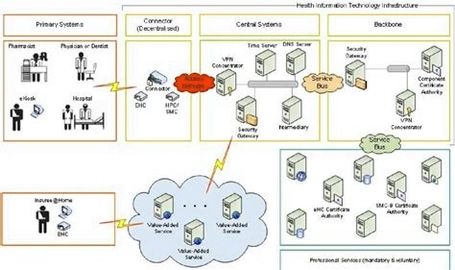
The digital health ecosystem in Germany is expected to be driven by cloud computing solutions, artificial intelligence (AI), robotics, smart wearables, big data analytics, and the Internet of Medical Things (IoMT) . The country’s national healthcare IT infrastructure project is inching forward to a roll-out. Its architecture is essentially a decentralized model, with regional eHealth networks of different providers. This entails high demands for common semantic standards, standardized interfaces, and secure interoperability especially at the server level, for managed care scenarios . The German E-Health network will be enabled by personal smart cards. The so-called ‘elektronische Gesundheitskarte’, issued by the compulsory sickness funds, will provide both physicians and pharmacists with access to patient data. Medical professionals will also have to use smart cards – separate ‘health professional cards’ to access e-prescriptions and other patient data .
